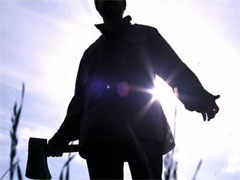
| HOME |
| NERVE |
| REVIEWS |
| ARCHIVE |
| EVENTS |
| LINKS |
| ABOUT US |
| CONTRIBUTORS |
| BACK ISSUES |
| CONTACT US |
 Dead
Man’s Shoes (15)
Dead
Man’s Shoes (15)
Directed by Shane Meadows
Reviewed by Tim Kopp
A return to form after the disappointing Once Upon A Time In The Midlands, Meadows’ revenge drama has enough pace and suspense to keep you interested but Cansidine’s performance and a few technical flourishes apart, it remains a competent rather than extraordinary work. (*** out of five).
Yorkshire, the present. Living with his younger, convulsive brother Andy on a run-down farm in the countryside, former soldier Richard tracks a group of drug dealers who are linked to a traumatic event in Andy’s past in the nearby town. Angrily they eventually confront him after he has taunted them, and he vows to gang leader Sonny to kill them all for what they have done to his brother. This sets a series of bloody confrontations in motion.
Spanning over the course of four days, Dead Man’s Shoes plays out like a Midlands version of the subgenre of the American revenge drama. Of the possibly best known of these, Michael Winner’s Death Wish, Roger Ebert wrote then in 1974 that for all the film’s craftsmanship, its unmistakable “call to vigilante justice” left him deeply disturbed. Shane Meadows, in a move that may surprise some, equally disregards the commonly accepted notion that vigilantism can never act as a deterrent to crime but instead complicates the issue. However, unlike its US predecessors, the film’s ending does acknowledge the self-destructive nature of self-justice. Altogether, the unapologetic stance towards Richards’ deeds in Dead Man’s Shoes gives the film an edge over the kind of committee-style of filmmaking that plays it safe.
Meadows’ film has enough decent suspense and disturbing moments to keep the pace for most of the 90 minutes, aided by the strong efforts of cast and crew, especially lead Paddy Considine as the lone vigilante whose brooding, quietly menacing demeanour, whose emotions or lack of it are further emphasised by frequent close-ups.
Making good use of the film’s limited budget (according to the director, it was shot for less than £1m), the production design and Danny Cohen’s cinematography add to the chilly atmosphere with subdued colours and a number of well-orchestrated shots; similarly, the editing achieves wonderful effects in what is probably the film’s most memorable scene when the dealers, now down to three, are on a drug-induced high.
The songs, including a number by Will Oldham, give the film a fitting sense of sadness and melancholy so that the clichéd and heavy-handed choir that accompanies the final flashback becomes even more grating. Using flashbacks to gradually put current events and character motivation in a clear context works reasonably well here, considering how many other films have struggled and failed in this respect.
It is a genre film that plays it straight, and thankfully rarely puts a foot wrong, and that in itself merits recognition. What it lacks though is the extra punch that a stronger director than Meadows might have provided: as it is, Dead Man’s Shoes is a solid, competently put together work but far from outstanding.